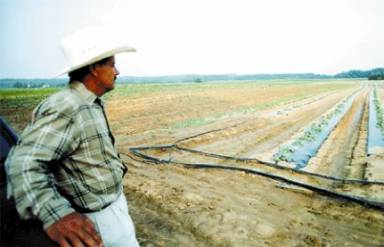
back

|
 |

Mexican Migrants Who Worked in U.S. Push for Old Savings
The Associated Press
February 15, 2004
Mexican migrants who worked in the United States 50 years ago met with Mexico's interior secretary this week, intensifying claims for millions of dollars in missing retirement funds.
Claims by the workers have gained momentum since President Bush proposed similar savings accounts as part of a temporary work program for new migrants. The money for the old program disappeared somewhere between banks in the United States and Mexico.
About 200 former migrants gathered in a park early Thursday, waiting to show Mexican officials old Justice Department identifications and yellowed work contracts from their time in the United States. They said they wanted a meeting with President Vicente Fox, and concrete promises that they would be paid.
"We aren't asking for charity," said Federico Alvarado, who spent the late 1950's and early 1960's picking crops in Texas, Arkansas, California and Michigan. "This money belongs to us."
Later, about 15 representatives met with Interior Secretary Santiago Creel, who said, "We aren't going to rest until we find a solution."
Mexican migrants, known as "braceros," worked in the United States from 1942 to the mid-1960's under a guest worker program that required that a portion of their earnings be deducted for retirement in Mexico.
As it is under Mr. Bush's plan, the money is collectible only in Mexico, an incentive for migrants to return home. But the braceros have never received the money, and demands for the deferred wages have been under investigation for decades.
Braceros contend the new migrants will not get their money either. José Cristobal Fernández, a coordinator for an alliance of former braceros, says the Bush savings plan has prompted former guest workers to demand that the old braceros accounts be cleared up.
"If you're going to open a new account today, well then settle the old one first; it's real simple," said Mr. Fernandez, of the Alianza Binacional Braceroproa, a group including former temporary workers in Mexico and the United States.
On Feb. 7, protesters from the alliance pushed past private guards at Mr. Fox's family ranch, 185 miles northwest of Mexico City, and spent about four hours on the property. The ranch's head of security has filed a criminal complaint, allowing the federal authorities to open an investigation into wrongdoing.
Ventura Gutiérrez, leader of the Braceroproa alliance, said the migrants planned to return to Mr. Fox's ranch yesterday and apologize to the president's family.
"We've had to resort to radical action for the government to take this subject seriously," said Rosa Martha Zarate, who coordinates a chapter of Braceroproa in California. "We hope that regardless of the consequences that the government will pay the braceros. "
Copyright © 2004
Global Action on Aging
Terms of
Use | Privacy
Policy | Contact Us
|

